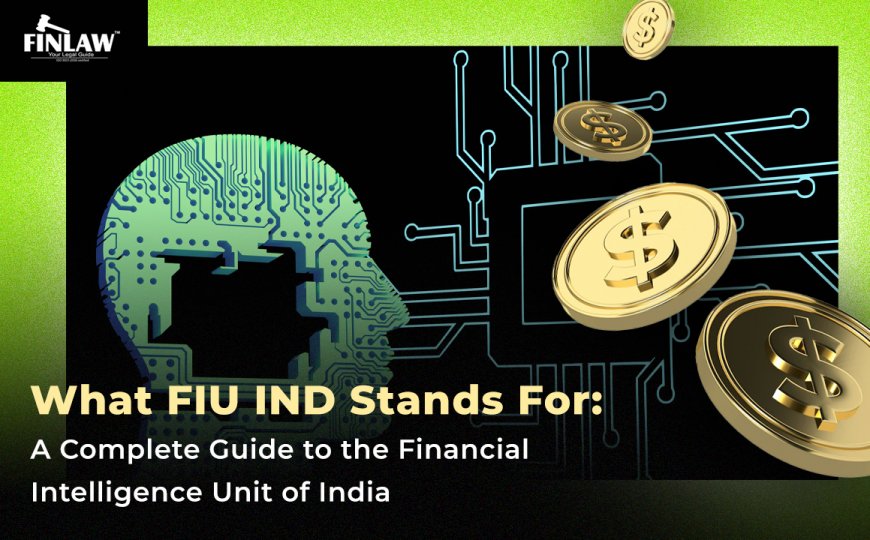What FIU IND Stands For: A Complete Guide to the Financial Intelligence Unit of India
Learn what FIU-IND stands for, its role, reporting rules, penalties, and why businesses in India must comply with this financial watchdog.

Introduction
The term FIU-IND often appears in compliance guidelines, regulatory updates, and news on financial crime investigations. But many people — including business owners, professionals, and even banking customers — still ask:
What does FIU-IND stand for?
What does FIU stand for in India?
The answer: FIU-IND stands for Financial Intelligence Unit — India.
This article provides a comprehensive guide to FIU-IND — its meaning, history, legal foundation, reporting requirements, role in India’s financial system, penalties for non-compliance, and why it matters to businesses and individuals.
What Does FIU-IND Stand For?
Simply put:
-
FIU stands for Financial Intelligence Unit.
-
FIU-IND stands for Financial Intelligence Unit — India, the Indian national agency for financial intelligence.
Established on 18 November 2004, FIU-IND operates under the Department of Revenue, Ministry of Finance. It is tasked with collecting and analyzing information about suspicious financial transactions to prevent money laundering, terror financing, and other financial crimes.
Unlike enforcement agencies that investigate and prosecute, FIU-IND works as an intelligence-gathering and analysis hub.
Legal Foundation of FIU-IND
FIU-IND derives its powers from the Prevention of Money-Laundering Act, 2002 (PMLA) and the rules notified under it.
Key provisions include:
-
Section 12 of PMLA: Mandates reporting entities (banks, NBFCs, payment operators, crypto exchanges, etc.) to maintain records and furnish information to FIU-IND.
-
PMLA Rules: Define the type of reports (STRs, CTRs, CBWTRs, IPRs) and the thresholds for reporting.
Thus, FIU-IND functions as the backbone of India’s AML/CFT regime (Anti-Money Laundering and Countering the Financing of Terrorism).
Why Was FIU-IND Created?
Before 2004, financial intelligence in India was scattered across multiple agencies. With rising cases of money laundering, black money circulation, and cross-border terror funding, India needed a centralized financial intelligence authority.
The creation of FIU-IND helped India:
-
Meet global AML/CFT obligations (FATF recommendations).
-
Strengthen domestic law enforcement with financial intelligence.
-
Improve international cooperation through secure intelligence-sharing networks.
Core Functions of FIU-IND
FIU-IND plays four crucial roles:
1. Collection of Information
It is the nodal body to which reporting entities submit:
-
Suspicious Transaction Reports (STRs)
-
Cash Transaction Reports (CTRs)
-
Cross-Border Wire Transfer Reports (CBWTRs)
-
Immovable Property Transaction Reports (IPRs)
2. Processing & Analysis
FIU-IND processes millions of records annually. By using data analytics and risk-based models, it detects red flags like:
-
Sudden high-value transactions inconsistent with customer profile.
-
Multiple small transfers designed to avoid detection (“structuring”).
-
Funds moving to high-risk jurisdictions.
3. Dissemination of Intelligence
Actionable reports are sent to:
-
Enforcement Directorate (ED)
-
Central Board of Direct Taxes (CBDT)
-
Central Bureau of Investigation (CBI)
-
State Police Forces
-
Regulators like RBI, SEBI, IRDAI
4. Guidance & Policy Support
FIU-IND issues advisories, red flag indicators, FAQs, and compliance guidelines to help reporting entities strengthen their anti-money laundering controls.
Structure & Governance of FIU-IND
-
Administrative Ministry: Department of Revenue, Ministry of Finance.
-
Supervisory Council: Economic Intelligence Council (EIC), chaired by the Finance Minister.
-
Leadership: Headed by a Director (rank equivalent to Joint Secretary or above).
-
International Membership: FIU-IND is a member of the Egmont Group, a global network of 170+ FIUs.
Through this membership, FIU-IND securely shares and receives intelligence with other nations to combat cross-border money laundering.
Who Must Report to FIU-IND?
Under PMLA, the following are reporting entities:
-
Banks (public, private, cooperative, foreign).
-
Non-Banking Financial Companies (NBFCs).
-
Insurance companies.
-
Securities intermediaries (brokers, mutual funds, depositories).
-
Payment system operators (UPI apps, wallets, payment gateways).
-
Virtual Asset Service Providers (VASPs) such as crypto exchanges.
-
Real estate agents (for high-value property transactions).
-
Casinos and gaming operators (where applicable).
-
Certain professionals (CAs, lawyers, company secretaries in designated cases).
Every reporting entity must appoint a Principal Officer, set up an AML compliance program, and file reports to FIU-IND in prescribed formats.
Why FIU-IND Compliance Matters for Businesses
For companies in India, compliance with FIU-IND obligations is critical because:
-
Legal Obligation: PMLA mandates reporting — failure can lead to penalties.
-
Reputational Risk: Non-compliance may attract bad publicity and loss of customer trust.
-
Regulatory Scrutiny: RBI, SEBI, IRDAI, and ED monitor compliance closely.
-
Investor Confidence: Businesses compliant with FIU-IND are more attractive to foreign investors.
-
Operational Protection: Helps prevent fraudsters from misusing legitimate business channels.
Penalties for Non-Compliance
Non-compliance with FIU-IND requirements can result in:
-
Monetary fines imposed by regulators.
-
Regulatory sanctions such as restrictions on operations.
-
Investigations by ED and police.
-
Criminal liability in cases of deliberate concealment or aiding money laundering.
Case Example: In recent years, several fintech companies and crypto exchanges operating in India received notices for non-registration with FIU-IND and for failure to submit STRs/CTRs. These actions highlight FIU-IND’s increasing enforcement role.
FIU-IND in Action: Real-Life Examples
-
Crypto Exchanges: In 2023, multiple exchanges were directed to register with FIU-IND to curb crypto-related money laundering.
-
Banking Sector: Several banks were fined for delayed reporting of STRs.
-
Gaming & Betting: Online gaming companies came under FIU-IND’s radar for possible misuse of wallets and digital platforms.
These examples show that FIU-IND is not limited to traditional banks — its reach extends to fintech, real estate, and emerging digital businesses.
FIU-IND’s Role in Global AML Framework
FIU-IND is part of India’s commitment to the Financial Action Task Force (FATF). By coordinating with foreign FIUs, India can:
-
Track funds across borders.
-
Investigate global terror financing.
-
Collaborate on typologies of new money laundering techniques.
How Citizens Are Impacted
Even if you are not a reporting entity, FIU-IND indirectly affects you:
-
Safer Banking: STR reporting helps banks detect fraud.
-
Clean Economy: Reduces the risk of black money distorting markets.
-
Better Investor Protection: By monitoring suspicious flows in securities/crypto, FIU-IND safeguards retail investors.
Frequently Asked Questions (FAQs)
Q1. What does FIU-IND stand for?
FIU-IND stands for Financial Intelligence Unit — India.
Q2. What does FIU stand for globally?
FIU stands for Financial Intelligence Unit, a national agency present in most countries to fight financial crimes.
Q3. Who regulates FIU-IND?
It works under the Department of Revenue, Ministry of Finance, and reports to the Economic Intelligence Council.
Q4. Is FIU-IND the same as RBI?
No. While RBI is a regulator, FIU-IND is an intelligence unit that collects and analyzes financial information.
Q5. Who must register with FIU-IND?
Banks, NBFCs, insurers, securities intermediaries, payment operators, crypto exchanges, and other designated businesses.
To summarize:
It is India’s central financial intelligence agency, responsible for fighting money laundering and terror financing.
For businesses, compliance with FIU-IND is not optional — it is mandatory under PMLA. Banks, NBFCs, fintechs, crypto platforms, and real estate operators must ensure timely reporting and strong AML frameworks.
In today’s globalized economy, where illicit funds move swiftly across digital platforms, FIU-IND plays a vital role in safeguarding India’s financial integrity and ensuring compliance with global standards.
What's Your Reaction?



















